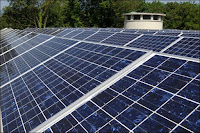We are on the eve of two important regional elections, but government programs are discussed and crowded rallies are held.
e ability to mobilize German society turns spring Saturday in large anti-nuclear demonstrations across the country. Potsdamer Platz in Berlin, tens of thousands of people dance and sing the old songs of the 70 anti-nuclear struggle, carrying large banners with pictures of Fukushima and openly hostile slogans against E. On and RWE, two large energy companies that threaten to a multimillion-dollar lawsuit asking the State compensation for breach of the covenant which closed in the fall with Merkel, prolonging the active life of the reactors until 2040 and the atomic energy.
The German Government, in a radical shift in energy policy, caused by the disaster in Japan, has been disconnected seven of the 17 anti-nuclear reactors and today took to the streets to demand the permanent abandonment.
"Only a matter of time!" repeated again and again, protesters against the police lines protecting, if anything, the Bundesrat. The protest also passes by the headquarters of the CDU, the Christian Democratic Party, a supporter of nuclear energy until a couple of weeks and now heads the movement of "relinquishing control" of atomic energy.
Nuclear Energy
Only a few months ago, Greenpeace climbers hung down the front of the Konrad Adenauer House displaying giant posters against nuclear, but now walk past the main entrance with no hint of reproach, despite polls showing that nearly 80 % of Germans believe the conversion is finished Merkel to the anti-nuclear cause and consider it rather an electoral gimmick that will fade with time.
But there seems to be going back. At least not in this crowd is sure sign of victory. "Did not you hear the deafening noise? The collapse of the nuclear age sounds like your day sounded in the fall of the Roman Empire ... and we have to celebrate!" Says a man in his 50 years leading to his grandson perched on their shoulders, convinced that together we are living a historic day.
Many of the placards referred to Chernobyl. After Greenpeace has equated the two tragedies.
Atomic Energy
The large amount of radioactivity released Fukushima plant since the accident which started on March 11, radionuclides of iodine-131 and cesium-137, are evidence supporting that this incident be reclassified and placed in the same category the one at Chernobyl, which occurred in April 1986, reports Ingo Freschen, coordinator of the ecopacifista in Berlin and serving media in an impromptu press center, next to a hot dog stand on the porch of Sony Center.
"This has nothing to do with the election campaign. Do not be so myopic. This is a movement much bigger and more powerful regional elections, is the determination of several generations have been finally convinced that so far We lied. We were told we could not do without nuclear power if we wanted to maintain our lifestyle, our Western economies, with all our freedoms, would go to waste, and it was not true. I have in front of their noses. Germany offline seven reactors and not only we did not sink, but has barely noticed the quake and all that happens is that we are celebrating this great feast, instead of staying at home spending unnecessary energy, "insists Freschen.
As was the case this winter, in protests against nuclear waste transport Gorleben, the group that nurtures these manifestations is a cross section in terms of age, intention to vote and social stratum, which gives much greater potential to claims, they can no longer be ignored by any political force in Germany.





















